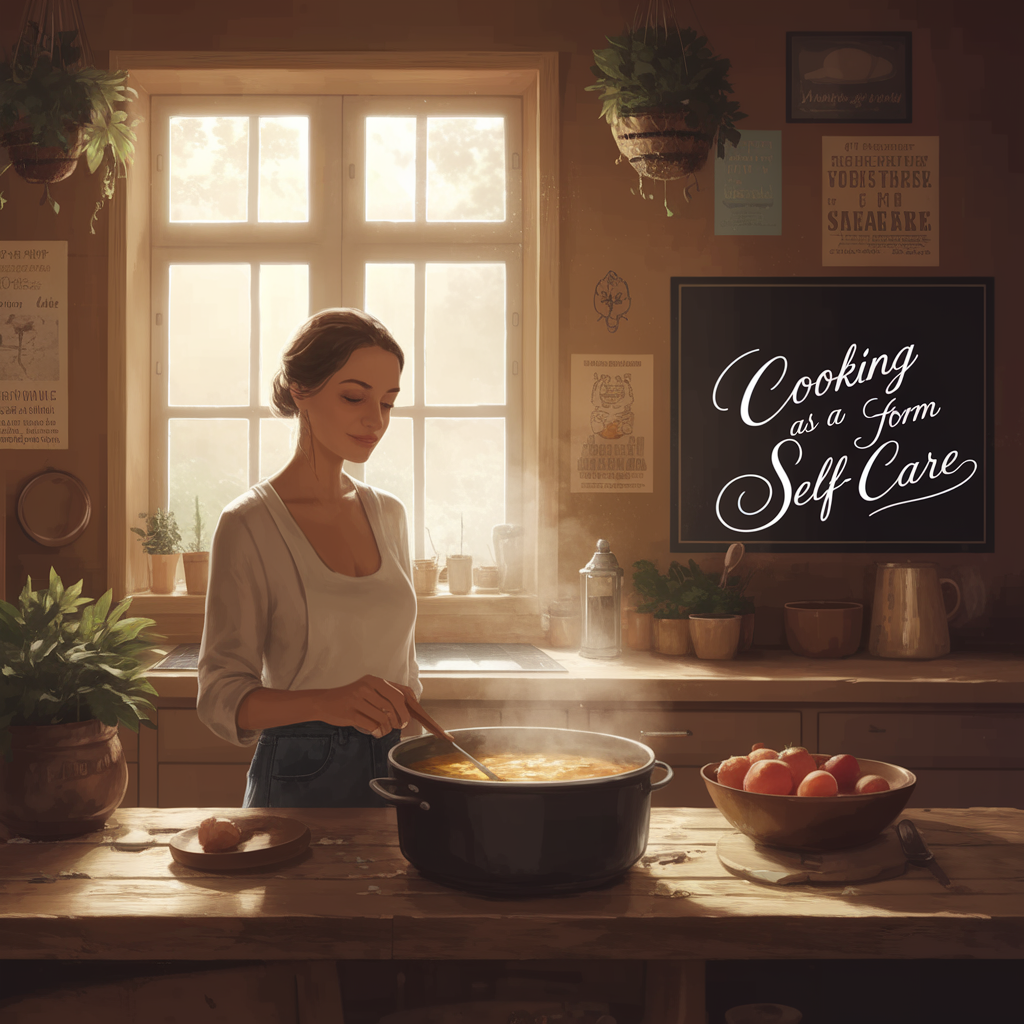Cooking as a Form of Self-Care
In a world where self-care has become almost a buzzword, we often overlook the simple act of cooking as a vital component of our well-being. It’s not just about nourishing the body; it’s about feeding the soul. You may be wondering, how can a task that sometimes feels like a chore also be a sanctuary? Let’s dive into the delicious realm of culinary self-care and explore how cooking can be a therapeutic experience.
The Therapeutic Benefits of Cooking
Cooking has been proven to have numerous psychological benefits. When you step into the kitchen, you engage your senses—sight, smell, touch, and even taste. This sensory engagement can lead to mindfulness, a state that allows you to be fully present in the moment. Research suggests that mindfulness can reduce anxiety and improve emotional regulation. In other words, cooking might just be the perfect antidote to a stressful day.
Think about it: after a long day, when you slice through fresh vegetables, hear the sizzle of oil in a hot pan, and inhale the rich aromas of spices, it’s hard not to feel a sense of calm wash over you. The act of chopping, stirring, and sautéing can be meditative, a way to escape the busyness of life. I remember the first time I made a risotto; the constant stirring felt oddly satisfying, almost like a dance. It was a moment where nothing else mattered except the rice, the broth, and me.
Cooking as a Creative Outlet
Beyond its therapeutic effects, cooking is a creative outlet. It offers a canvas for self-expression, allowing you to experiment with flavors, colors, and textures. Whether you’re whipping up a classic dish or inventing something entirely new, cooking encourages you to be innovative. And let’s be honest—who hasn’t felt a surge of joy when plating a meal that looks like it belongs in a magazine?
Consider the freedom that comes with cooking. You can choose to follow a recipe to the letter or toss caution to the wind and let your instincts guide you. I recall a time when I wanted to recreate my grandmother’s famous soup, but all I had were some random vegetables in the fridge. Instead of panicking, I embraced the challenge. The soup turned out to be a delightful surprise—sometimes the best meals are those born out of spontaneity.
Connecting with Tradition and Culture
Cooking also provides a unique opportunity to connect with your roots. Family recipes passed down through generations carry not just ingredients, but stories, memories, and traditions. When you cook a dish that your family has made for years, you’re not just following a recipe; you’re engaging in a ritual that can foster a sense of belonging and identity.
For instance, every holiday season, my family gathers to prepare our traditional feast. Each dish has its own history, and as we cook, we share stories about loved ones who have passed or funny mishaps from past gatherings. These moments create a bond that transcends the food itself. It’s about connection—both with each other and with our heritage.
Mindful Eating and the Joy of Flavors
When we talk about cooking, we can’t ignore the importance of mindful eating. The act of preparing food often leads to a deeper appreciation of what we consume. Engaging with the ingredients, understanding their origins, and savoring each bite transforms eating from a mundane task into a pleasurable experience.
Mindful eating encourages us to slow down and really taste our food. It’s not just about filling our stomachs; it’s about enjoying the flavors, textures, and aromas. I remember a time when I sat down with a homemade bowl of pasta, taking small bites to relish the sauce I had crafted myself. Each mouthful was a celebration of the effort I had put into creating it. That’s the magic of cooking; it can turn a simple meal into a moment of pure joy.
Cooking as a Social Activity
Let’s not forget that cooking can be a social affair. Whether you’re whipping up a meal for friends, hosting a dinner party, or simply cooking alongside a partner, the kitchen can be a space of laughter and camaraderie. There’s something about the act of sharing food that brings people together. It’s a universal language, one that transcends barriers and fosters connections.
I often find that the most memorable nights are those spent in the kitchen with friends, music playing in the background, and the aroma of a shared meal wafting through the air. Cooking together can lead to spontaneous dance parties and laughter over culinary mishaps. Remember that time someone accidentally spilled flour everywhere? Right, we all had a good laugh—and the cookies turned out just fine, albeit with a few extra ingredients!
Exploring New Culinary Horizons
Cooking also presents an opportunity for exploration. Trying out new recipes or cuisines can be an adventure. Maybe you’ve always wanted to make sushi, or perhaps you’re curious about the spices used in Indian cooking. Each new dish provides a chance to expand your culinary repertoire—and your palate.
Venturing into unknown culinary territories can feel a bit daunting at first, but think of it as a journey. I once decided to tackle homemade dumplings, and while they didn’t look perfect, the satisfaction of crafting something from scratch was worth the effort. Sometimes the process is just as important as the final product. Plus, there’s nothing like the thrill of impressing friends with a dish you once thought was out of reach!
Setting the Mood: Creating Your Cooking Space
The environment in which we cook can significantly influence our experience. Setting the mood can transform the kitchen into a sanctuary. Consider lighting a few candles, playing your favorite playlist, or even wearing an apron that makes you feel fabulous. These little details can elevate your cooking session from mundane to magical.
When I cook, I often find myself lighting a few candles and playing some mellow jazz. It creates an atmosphere that helps me relax and enjoy the process. Without the pressure of a ticking clock, I can focus on the joy of cooking rather than the outcome. Sometimes, it’s easy to forget that cooking is meant to be enjoyable—not just a means to an end.
Cooking for Self-Care: Practical Tips
So how can you incorporate cooking into your self-care routine? Here are some practical tips to get started:
- Schedule Cooking Time: Treat your cooking sessions as appointments for self-care. Block out time in your calendar to experiment, try new recipes, or simply prepare your favorite meals.
- Start Simple: If you’re not an experienced cook, begin with easy recipes. Gradually build your skills and confidence. (Remember, nobody expects you to be a master chef right away!)
- Experiment with Ingredients: Don’t be afraid to try new ingredients or flavors. Visit a local farmer’s market to find fresh produce or unique spices that inspire you.
- Invite Friends or Family: Cooking with others can make the experience more enjoyable. Share the workload and the laughs—plus, you get to bond over a delicious meal!
- Document Your Journey: Keep a cooking journal to note down your successes and failures. This can be a fun way to track your progress and reflect on your culinary adventures.
Potential Challenges and Finding Solutions
Of course, as with any form of self-care, there can be challenges. Some might find cooking to be a source of stress rather than relaxation. Maybe it’s the pressure of time, the fear of failure, or simply not knowing where to start. But fret not! Here’s how to tackle these obstacles:
- Time Constraints: If you’re short on time, consider meal prepping. Spend a few hours on the weekend to prepare meals for the week ahead. This way, you can enjoy cooking without the daily stress.
- Recipe Overwhelm: With countless recipes available, it’s easy to feel overwhelmed. Choose a few trusted sources, or even select a theme for the week (like Italian or vegetarian) to simplify your choices.
- Fear of Mistakes: Embrace the learning process! Every cook makes mistakes—just ask my burnt toast incident from last week. Laugh it off and remember that even the most seasoned chefs have their off days.
Cooking as Self-Care: A Personal Journey
Throughout my own life, cooking has been a constant companion. It’s a creative outlet, a source of connection, and a method of self-soothing. There have been nights when the kitchen became my refuge after a long day, and I’d lose myself in the rhythm of chopping and stirring. Each meal served as a reminder that I was taking care of myself, one bite at a time.
As I reflect on my culinary journey, I realize that cooking is more than just a task; it’s an act of love—both for myself and for those I share my meals with. Whether I’m trying out a new recipe or sticking to an old favorite, each dish tells a story. It’s a way to nurture not only my body but also my spirit.
Conclusion: Embrace the Culinary Journey
In conclusion, cooking can be a powerful form of self-care that nourishes both body and soul. Whether you’re seeking mindfulness, creativity, connection, or simply a delicious meal, the kitchen can be your haven. So, the next time you find yourself stressed or overwhelmed, consider reaching for a spatula instead of a remote. Dive into the world of flavors, aromas, and textures that cooking has to offer. You might just find that it’s the self-care practice you never knew you needed.
Remember, cooking isn’t about perfection; it’s about enjoyment, exploration, and a little bit of messiness along the way. So roll up your sleeves, put on that apron, and let the culinary adventure begin!






